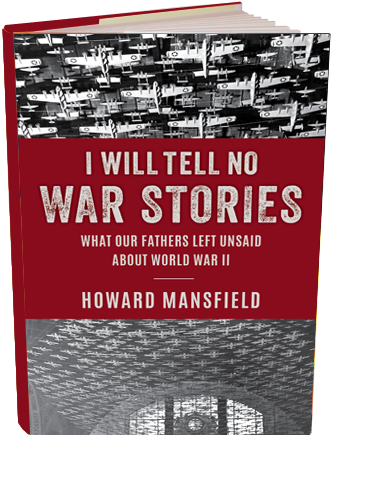I Will Tell No War Stories: What Our Fathers Left Unsaid About World War II
Lyons Press (April 2024)
ISBN: 978-1-4930-8108-0
The War – WWII – was everywhere when I was a boy – in movies and books, on TV, and yet most of it was hidden, untold. What the men up and down my street – home from the Navy, Marines, Army – what they had seen was left unsaid. It was like growing up on an iceberg. We were afloat on a hidden history. The real war was missing.
My father wouldn’t talk about the war. It was a rule with him, as it was with most of his generation. “You’re not getting any war stories from me,” he’d say. So: no war stories for us.
But the memories of that war were hiding out in our house. Shortly before my father died, we were cleaning out the old family home. I found a small, folded set of pages that had sat in a drawer for 65 years. It was a short journal of the bombing missions he had flown. I had no idea he’d kept this record. Airmen were forbidden to keep diaries.
I quickly read through it, drank it down in a gulp. Some of the missions he flew were harrowing, marked by attacking fighters, anti-aircraft cannon blowing holes in his plane, and wounding crewmen. They had limped back to England flying on three of the four engines with another engine threatening to quit. He’d seen bombers blown out of the sky, exploding into nothing – ten men, eighteen tons of aluminum with tons more of high explosives and fuel: Just gone. And they had to fly on.
He had seen the war as all the flyers saw it.
He had seen flak from the big anti-aircraft guns hitting the big bombers in a rain of steel pellets. It sounded like hail on a tin roof, like BBs rolling around, said the airmen. It could tear into the bomber’s aluminum skin with a “shriek” or a “hissing.” It could hit the head of your pilot or miss by an inch. Loose, hot steel rattling around, as if your anxieties had taken shape. It was lethal with a randomness that was cruel. They could smell the flak through their oxygen masks.
The stories of flak are a literature of near misses, of geometry, chance, and luck. It was a universe in which an inch or two separated life and death or injury.
Minutes. Inches. Banal changes that meant life or death. Back in the peacetime world — working nine-to-five, taking children to get shoes — how could the veterans explain that they were only in this life by a few inches? It was as though they’d realized — years before the physicists’ theories — that many universes exist side by side: The world with them and the world without them. They saw it and they had no words for it.
So that was part of it, part of not talking. Behind their silence was an experience too intense and too personal to be expressed. For some veterans there was trauma, yes. There was what came to be known as PTSD. But there were other reasons. For his generation, not telling was a code of honor. By their silence they said, I give you peace. Take it. Take it and don’t ask me for more. I will tell no war stories.
I Will Tell No War Stories is about undoing the forgetting in our family and in a society that has hidden the horrors and cataclysm of a world at war. Some part of that forgetting was necessary for the veterans, otherwise how could they come home, how could they find peace?
I Will Tell No War Stories is, finally, about learning to live with history, a theme I have explored in some of my earlier books like In the Memory House and The Same Ax, Twice.

